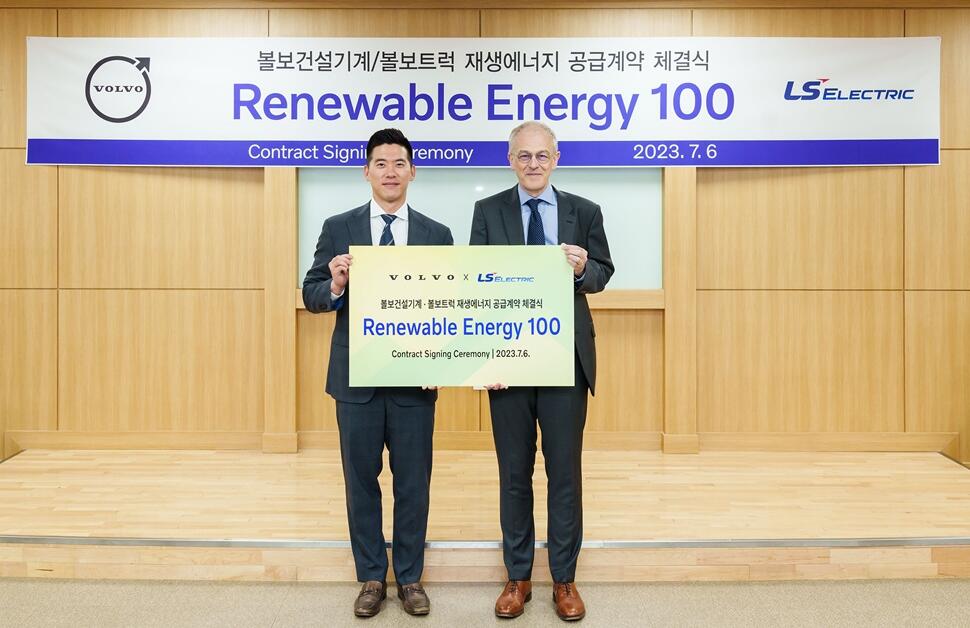Volvo Construction Equipment continues renewable energy shift with solar power installation

- Over 20 years the Changwon plant will receive an average annual supply of 55 GWh of renewable energy – resulting in a reduction of about 21,000 tons of CO2 emissions a year.
- Starting next year, the purchase agreement is set to play a key role in the plant’s target to reduce greenhouse gas emissions by 50% by 2030 – from a 2019 baseline.
- The move forms part of Volvo CE’s industry-leading pledge, validated by the Science Based Targets initiative, that includes a transition to 100% renewable energy within its operations.
Volvo CE has signed a purchase agreement with power provider LS Electric for the implementation of solar panels and a Factory Energy Management Solution (FEMS) at its Changwon facility in South Korea. Volvo CE has committed to buy the green electricity for a span of 20 years – from 2024 to 2043. It is expected to provide approximately 55 GWh of renewable energy a year.
This will enable Volvo CE in Korea to reduce around 21,000 tons of CO2 emissions annually, which is equivalent to planting 1.5 million pine trees or saving about 10 million liters of petroleum from a thermal power plant. This site is expected to be running 100% renewable energy by 2026.
Renewable energy provision is an important part of Volvo CE’s global Science Based Targets commitment, which targets net zero value chain greenhouse gas emissions by 2040, with significant reductions as early as 2030. With a long-time focus on environmental care and driving industry transformation to combat climate change, the company’s interim 2030 goals are to not only achieve a 30% reduction in carbon emissions across the use of its products through its electrification roadmap, but to cut emissions in half across its own operations, facilities and manufacturing processes.

Koo Dong-hwi, Managing Director of LS Electric (left) and Andrew Knight, Head of Excavator Strategy & Managing Director, Volvo CE Korea
All-embracing decarbonization
Andrew Knight, Head of Excavator Strategy & Managing Director, Volvo CE Korea, says: “We are dedicated to sustainable growth and establishing pioneering partnerships to help accelerate that growth. With this agreement, Volvo CE aims to transition all electric consumption to renewable energy at the Changwon plant. Through this holistic approach, we are leading our industry’s transformation towards a carbon neutral future.”
The Changwon facility is the company’s biggest excavator production site and also specializes in the manufacturing of demolition equipment and pipelayers, as well as having a Research and Development department.
As well as this investment, it has already begun to introduce electric forklifts and Automated Guided Vehicles (AGVs) into its operations, with plans also underway to gradually phase out the usage of kerosene for heating, starting in 2026, and implement a conversion to LNG fuel electric energy by 2028. Through these efforts, the facility has so far achieved a saving of 10,616 MWh of total energy consumption at the Changwon Plant and a 20% increase in energy efficiency since 2014.
In the future, Volvo CE in Korea plans to ensure a stable supply of renewable energy by establishing its own power grid and entering into a direct power purchase agreement (PPA) with LS Electric, enabling it to procure electricity from external power generation facilities.
Volvo Trucks Korea has also announced its own partnership with LS Electric for the procurement of solar energy to supply the Dongtan, Gimhae, and Incheon offices in South Korea.
 The Changwon site in South Korea.
The Changwon site in South Korea.
Downloads
-
Volvo Construction Equipment continues renewable energy shift with solar power installation - press release (PDF, 977.8KB) -
Volvo Construction Equipment continues renewable energy shift with solar power installation - press release (JPG, 609.6KB) -
Volvo Construction Equipment continues renewable energy shift with solar power installation - image 2 (JPG, 557.4KB) -
Volvo Construction Equipment continues renewable energy shift with solar power installation - image 3 (JPG, 700.4KB)
FOR FURTHER INFORMATION
Åsa Alström
Head of Strategic Communications
Volvo Construction Equipment
E-mail: asa.alstrom@volvo.com